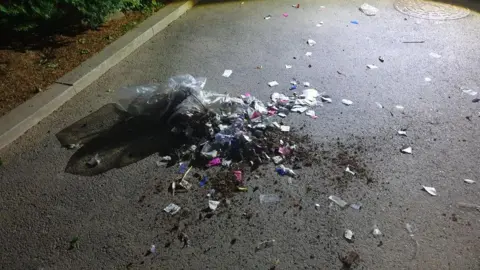North Korea drops trash balloons on the South
North Korea has dropped at least 260 balloons carrying rubbish in the South, prompting authorities to warn its residents to stay indoors.
South Korea's military also cautioned the public against touching the white balloons and the plastic bags attached to them because they contain "filthy waste and trash".
The balloons have been found in eight of nine provinces in South Korea and are now being analysed.
North and South Korea have both used balloons in their propaganda campaigns since the Korean War in the 1950s.
South Korea's military had earlier said it was investigating whether there were any North Korean propaganda leaflets in the balloons.
The recent incident comes days after North Korea said it would retaliate against the "frequent scattering of leaflets and other rubbish" in border areas by activists in the South.
"Mounds of wastepaper and filth will soon be scattered over the border areas and the interior of the ROK and it will directly experience how much effort is required to remove them," North Korea's vice-minister of defence Kim Kang Il said in a statement to state media on Sunday.
Republic of Korea or ROK is the official name of South Korea while the North is called DPRK or the Democratic People's Republic of Korea.
Late on Tuesday, residents living north of the South's capital Seoul and in the border region received text messages from their provincial authorities asking them to "refrain from outdoor activities".
They were also asked to file a report at the nearest military base or police station if they spot an "unidentified object".
 South Korean military
South Korean militaryPhotographs shared on social media show bags attached via string to white translucent balloons carrying toilet paper, dark soil, and batteries, among other contents.
Police and military officers are seen in some of these photographs.
South Korea's Yonhap news agency reported that "some of the fallen balloons carried what appears to be faeces judging from its dark colour and odour".
South Korea's military condemned the act as a "clear violation of international law".
"It seriously threatens the safety of our people. North Korea is entirely liable for what happens due to the balloons and we sternly warn North Korea to immediately stop this inhumane and crass action," the military said.
In addition to anti-Pyongyang propaganda, activists in South Korea have launched balloons carrying among other things, cash, banned media content, and even Choco Pies - a South Korean snack banned in the North.
Earlier this month, a South Korea-based activist group claimed it had sent 20 balloons carrying anti-Pyongyang leaflets and USB sticks containing Korean pop music and music videos across the border.
Seoul's parliament passed a law in December 2020 that criminalises the launch of anti-Pyongyang leaflets, but critics have raised concerns related to freedom of speech and human rights.
North Korea has also launched balloons southward that attacked Seoul's leaders. In one such launch in 2016, the balloons reportedly carried toilet paper, cigarette butts and rubbish. Seoul police described them as “hazardous biochemical substances”.
With additional reporting by Jake Kwon in Seoul
